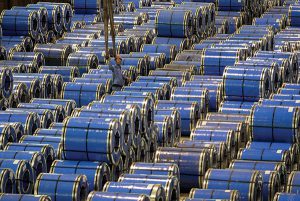Bloomberg
Japan’s biggest steelmaker is calling on Tokyo to provide at least 2 trillion yen ($17.3 billion) in subsidies over almost three decades to meet net-zero carbon targets, as it seeks to stay competitive against China and other global rivals.
Nippon Steel needs the money to vie on an “equal footing,†according to Hideo Suzuki, the managing executive officer overseeing its net-zero initiative. The company expects it will cost as much as 5 trillion yen to build facilities enabling decarbonisation by 2050.
Suzuki said without the financial leg up, Chinese rivals — which already churn out more than half of the world’s steel — will be a greater threat to Japanese producers, as they will be able to take advantage of massive funding from their own centralised government. “China has strong leadership, authority and abundant funds,†Suzuki said.
What Nippon Steel is asking of Japan is a sign of what governments worldwide face as they commit their industries to strict net-zero targets. The global steel industry alone is estimated by BloombergNEF to be required to spend $215 billion to $278 billion for capital investments by 2050.
The pressure is increasing amid a global race to develop green steel, with key suppliers including China Baowu Steel Group and European giant ArcelorMittal SA all pledging to become carbon neutral by the middle of this century.
Nippon Steel will ask the government for more funds, given it will need 1 trillion yen for research and development alone over the period, Suzuki said. He pointed to Beijing’s funding to its top producer China Baowu being more than four times what Japan’s entire steel industry receives in government subsidies.
So far, Japan has allocated just a fraction of what Nippon Steel is seeking. The nation has earmarked 193.5 billion yen over 10 years from its 2 trillion yen green fund for research and development of net-zero steel, Suzuki said.
“It will cost a lot of money to realise carbon neutrality,†Takeshi Hashimori, a deputy director at the metal industries division of Japan’s Ministry of Economy, Trade and Industry. “If there’s a need for R&D and investment in facilities, the government intends to make careful consideration and provide necessary support.â€
Steel production currently relies heavily on coal-fired furnaces, putting pressure on global suppliers to develop technology, including use of hydrogen as a replacement for the key feedstock and fuel. The industry is responsible for about 15% of carbon emissions in both Japan and China, and 7% of greenhouse gases worldwide. Nippon Steel has been making steel from mined iron and coal in blast furnaces for more than a century.
 The Gulf Time Newspaper One of the finest business newspapers in the UAE brought to you by our professional writers and editors.
The Gulf Time Newspaper One of the finest business newspapers in the UAE brought to you by our professional writers and editors.
